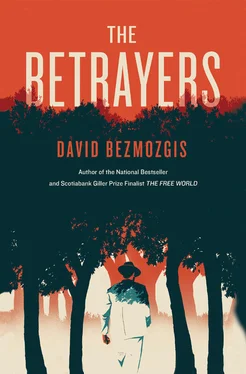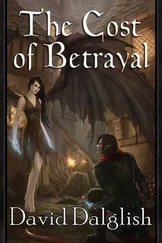— No? And why not?
— The reason I can’t do it, the reason I’m forced to hold Volodya to account, no longer has anything to do with him. Even if I still believed that he deserved punishment for what he did, I agree that he has served his term, such as it is. If it were simply between him and me, I would say it: Volodya, I forgive you. But I can’t go before the world and say that he was not culpable for his actions. Because the world would misunderstand.
A groan emanated from Tankilevich, and, as if with his last strength, he gripped the sofa and tried to lift himself up. Svetlana’s hands fluttered about him, as though trying to dissuade and assist him at once. And he responded in kind, repelling and requiring her until he achieved a sitting position. He propped himself, somewhat precariously, against the arm of the sofa. But he was burning to speak.
— It’s all very clear, Tankilevich said. You are the Shield of David protecting Israel from my toxic influence.
— That isn’t what I am saying, Volodya.
— What you are saying is that I was not born a man but some sort of worm. And that most men who roam the earth are also worms. But as one such worm, I can tell you that if I had it to do over again, I would choose just as I did. If I hadn’t agreed to work for the KGB, they would have killed my brother. And for all the trouble I caused you, you survived and prospered. So now you tell me how you, a man, would have acted differently.
Kotler looked unwaveringly at Tankilevich.
— Haven’t I already answered that question? Kotler said. I couldn’t have done what you did. Sooner than betray any of my brothers, I was prepared to die, to lose my wife, and to abandon my parents to a lonesome old age.
Kotler looked to Leora, who had observed all this coolly and silently. It was a coolness extended even to himself, he felt. As if he’d been weighed in the balance and found wanting. He’d never sensed it from her before.
He turned back to Tankilevich and addressed him as gently as he could.
— Here is what I will say to you, Volodya. And I say it without malice. Israel doesn’t need you. It has thousands like you. Thousands of old generals on park benches plotting the next war with the Arabs. It can do without another. So why go to a place where you are not needed? Why not ask instead: Where am I needed? Where do my people need me? And choose that place. Choose that place, for the first time in your life, of your own free will.
— Choose to wither away, the last Jew in Crimea.
— If so, a noble end.
— If it’s so noble, then why me and not you?
— Because I am still needed elsewhere, Volodya. Though I’m not sure for how much longer. I may yet join you here. We can both be the last Jews of Crimea or, God knows, part of another exile, another return.
Kotler checked his watch and looked out the window. There was no sign of the ambulance.
— We should pack, Kotler said. We should go.
He took a step in the direction of their room and glanced at Leora to see if she would follow. She did, though her face retained the same cool, inscrutable cast.
Kotler had taken several more steps when he recalled one last thing. He turned back to see Tankilevich now lying on his back again, his eyes open as Svetlana peered anxiously at him.
— Volodya, Kotler spoke.
Tankilevich inclined his head toward him.
— The night before your letter appeared in Izvestia, you broke all those plates in our apartment. Do you remember?
He waited for Tankilevich to respond, to evince the least animate gesture.
— Do you remember? Kotler repeated.
— I remember everything, Tankilevich said slowly.
— I never understood it. What happened there? All those broken plates. And then sitting in the kitchen to glue them together.
— What happened? Tankilevich said. Very simple. I needed to do something with my hands. It was either that or I kill you. And spare us both.
Once more, as on the previous day, Kotler and Leora, trailing suitcases, made their way among the sunburned vacationers on the esplanade. It was still before nine, but the day’s procession had already begun. Was there another people who approached the phenomenon of leisure as systematically as the Russians? Was there a people who took the sun and the waters with more conviction and diligence? Natural remedies, holistic treatments, folk cures, mineral therapies — and the doctors and professors and experts who promoted them. The rival flows of mysticism and science that irrigated the Russian heart, a manifestation of the failed Soviet project. Backwardness yoked to forwardness. This was one of its more harmless manifestations. His father had embraced it. At dawn, he would already be walking along the shore, vigorously swinging and rotating his arms. By seven, he would have claimed a strategic spot on the beach. Soon after, Kotler and his mother would join him. Throughout the day they would follow a salubrious regimen of walks and swims because it was not acceptable to simply laze about. The sunlight contained vitamins. Walking at a prescribed pace improved the circulation. Immersion in salt water restored the skin. And the quality of the air for the respiratory system! And the aromatic wildflowers for teas and infusions! And the pleasure his father derived from the word nutrient!
Kotler and Leora picked their way through the vacationers toward the Internet café. Like the last Jewish stragglers, Kotler thought, with their suitcases and cheerless expressions in the holiday sunlight. Though, technically, that sad distinction belonged to Tankilevich. Capricious fate had cast him as the final link in the long chain of Crimean Jewry. A chain that stretched back more than a thousand years to the Khazars, the last Jewish warriors and emperors, if legend was to be believed. The Khazars, the Krymchaks, the Karaites. And, in the past century, the doomed farming colonists and Yiddish poets who had imagined a homeland in Crimea, a New Jerusalem to supplant the Old. Now it was coming to a close, like all Jewish stories came to a close, with suitcases.
There were only two other people in the Internet café when they arrived. Two young women typing quietly at opposite ends of the room. Between them were half a dozen vacant machines. The raucous boys waging war were gone. It was too early for them. Or perhaps the dark room with the strobing screens could not compete with the offerings of a summer morning. This could be construed as proof that the world was not yet beyond repair.
As before, Kotler and Leora took two neighboring machines. They propped their suitcases behind their chairs and started to seek their way home. In no time, they had it. At midnight, a flight departed Kiev for Tel Aviv. At eight in the evening, a flight departed Simferopol for Kiev. Seats were available on both flights. They could purchase them in a matter of minutes through the computer. Kotler reached for his wallet and his credit card. Leora stopped him.
— It is the same airline, Leora said. I will call to see what they charge to change the tickets.
— Unfailingly prudent, Baruch said.
— I see no reason for you to throw any more of your money away.
— Any more? Do you mean what I gave to Tankilevich?
— I mean this entire trip, Baruch. It was a mistake.
She spoke the words with a cold stoicism, the lingering effect, it seemed, of whatever had disturbed her at Tankilevich’s house.
— The fault is mine, Kotler said. Forgive me.
— You don’t need to apologize. Nor do you need to absolve me before the whole of the Jewish people.
Leora reached into her purse, took out her phone, and dialed the number for the airline. Kotler watched her as she waited for the system to connect and then as she submitted to the gauntlet of recorded prompts. Sensing her mood, he left her to the task and turned to his computer screen to key in the address for Haaretz. Unlike the previous day, he was not greeted by an unflattering image of his own face. His story had already dropped several rungs down the news ladder. Besides, his story had only ever been preliminary to the main story. And that story, after its interminable lead-up, was now in the offing. On the screen appeared the opening stages of the drama: Stricken, grieving, furious settlers facing columns of distressed and stone-faced Israeli soldiers and police. A young Orthodox mother, hardly older than a girl, in head scarf and long skirt, thrusting her squalling infant into the face of a young female soldier. A group of young men, with the long, flowing payos and the disheveled dress of the hilltop youth, who had chained themselves to the ark in a synagogue. A different group of men, older, who had each donned the striped costume of the concentration camp inmate, with the crude yellow Star of David sewn over the breast. The full shameful, histrionic, heartrending pageant was on display. He motioned for Leora to look. She gave a cursory glance, no more.
Читать дальше












